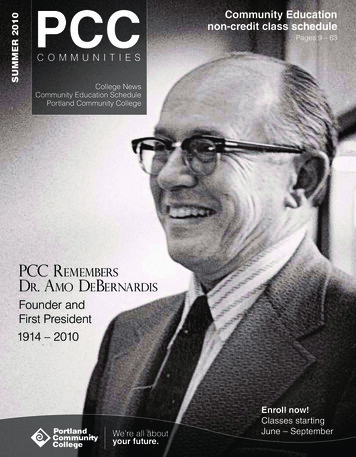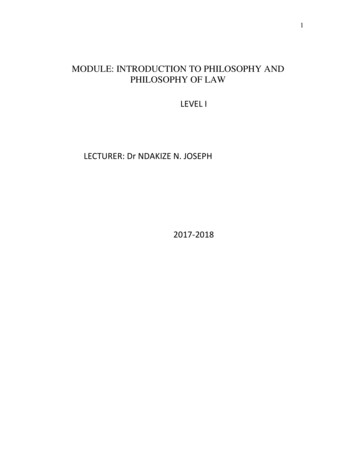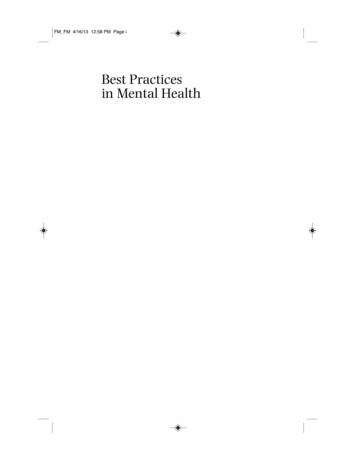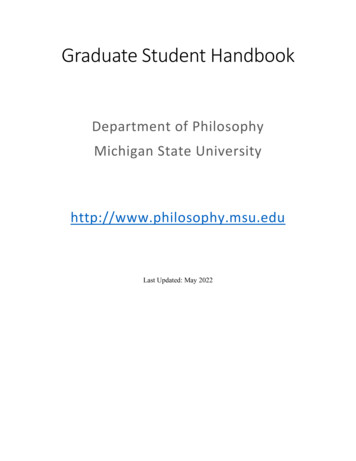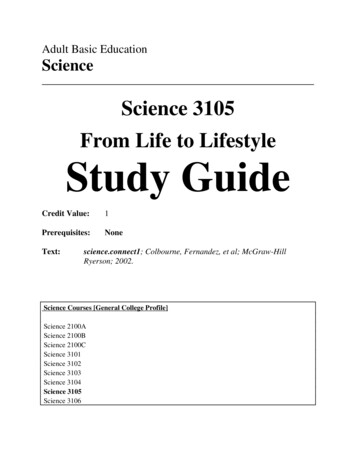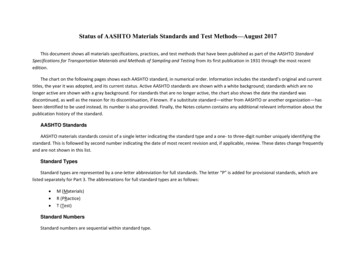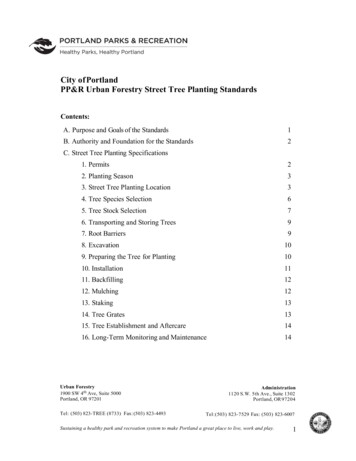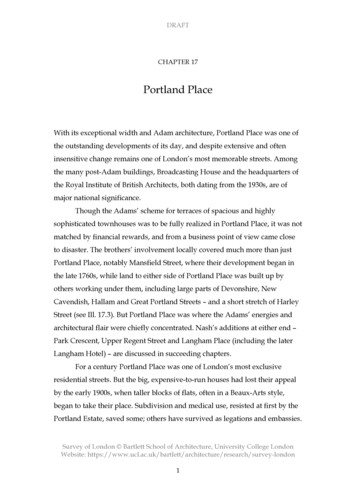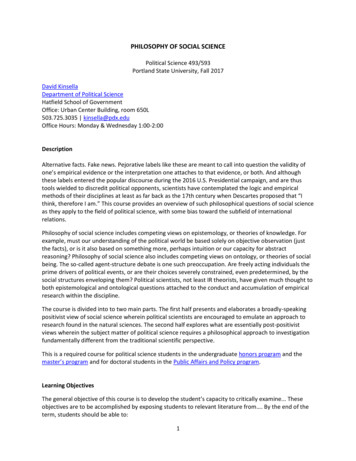
Transcription
PHILOSOPHY OF SOCIAL SCIENCEPolitical Science 493/593Portland State University, Fall 2017David KinsellaDepartment of Political ScienceHatfield School of GovernmentOffice: Urban Center Building, room 650L503.725.3035 kinsella@pdx.eduOffice Hours: Monday & Wednesday 1:00-2:00DescriptionAlternative facts. Fake news. Pejorative labels like these are meant to call into question the validity ofone’s empirical evidence or the interpretation one attaches to that evidence, or both. And althoughthese labels entered the popular discourse during the 2016 U.S. Presidential campaign, and are thustools wielded to discredit political opponents, scientists have contemplated the logic and empiricalmethods of their disciplines at least as far back as the 17th century when Descartes proposed that “Ithink, therefore I am.” This course provides an overview of such philosophical questions of social scienceas they apply to the field of political science, with some bias toward the subfield of internationalrelations.Philosophy of social science includes competing views on epistemology, or theories of knowledge. Forexample, must our understanding of the political world be based solely on objective observation (justthe facts), or is it also based on something more, perhaps intuition or our capacity for abstractreasoning? Philosophy of social science also includes competing views on ontology, or theories of socialbeing. The so-called agent-structure debate is one such preoccupation. Are freely acting individuals theprime drivers of political events, or are their choices severely constrained, even predetermined, by thesocial structures enveloping them? Political scientists, not least IR theorists, have given much thought toboth epistemological and ontological questions attached to the conduct and accumulation of empiricalresearch within the discipline.The course is divided into to two main parts. The first half presents and elaborates a broadly-speakingpositivist view of social science wherein political scientists are encouraged to emulate an approach toresearch found in the natural sciences. The second half explores what are essentially post-positivistviews wherein the subject matter of political science requires a philosophical approach to investigationfundamentally different from the traditional scientific perspective.This is a required course for political science students in the undergraduate honors program and themaster’s program and for doctoral students in the Public Affairs and Policy program.Learning ObjectivesThe general objective of this course is to develop the student’s capacity to critically examine. Theseobjectives are to be accomplished by exposing students to relevant literature from . By the end of theterm, students should be able to:1
grasp alternative epistemological and ontological positions in the social scientific literature,especially political science;connect the evolution of philosophical debates to the history of the political science discipline;ascertain these philosophical positions in political research even when they are not madeexplicit by researchers; andcritically reflect on their own epistemological proclivities when designing and conducting socialscientific research for their thesis projects.Requirements and EvaluationIn this course, the main workload consists of assigned reading. Required readings should be readcarefully prior to the session for which they are scheduled. All students are assigned readings indicatedwith solid bullets ( ); graduate students are assigned, in addition, those with open bullets ( ). A numberof supplemental readings are provided should want to follow up on particular topics that interest you;none are assigned for this course.Undergraduate course grades are based on an in-class midterm exam (35%) and either a take-home oran in-class final exam, student’s choice (65%). Graduate course grades are based on three short papers(30%), each offering a critical review of the reading assigned for that week, and a take-home final (60%).Graduate students will also be asked to make one or two brief presentations on a reading from thegraduate reading list (10%).ReadingsThere are no required textbooks for this course. All required readings are available online. Unless thereading includes a link to a web or D2L file, it is available online from the PSU library. You must retrievethese readings (all journal articles) by logging into the PSU library website and locating and downloadingthe article from one of the library’s full-content subscription services.For those interested in background or integrative reading material on philosophy of social science mostrelevant to political science and international relations, there are several options, including: Jon Elster, Explaining Social Behavior: More Nuts and Bolts for the Social Sciences (CambridgeUniversity Press, 2015).Len Doyal and Roger Harris, Empiricism, Explanation and Rationality: An Introduction to thePhilosophy of the Social Sciences (Routledge, 2008).Martin Hollis, The Philosophy of Social Science: An Introduction (Cambridge University Press,1994).Ted Benton and Ian Craib, Philosophy of Social Science: The Philosophical Foundations of SocialThought (Palgrave, 2001).Daniel Little, Varieties of Social Explanation: An Introduction to the Philosophy of Social Science(Westview, 1990).Fred Chernoff, Theory and Metatheory in International Relations: Concepts and ContendingAccounts (Palgrave Macmillan, 2007).Patrick Thaddeus Jackson, The Conduct of Inquiry in International Relations: Philosophy ofScience and its Implications for the Study of World Politics (Routledge, 2011).2
The assigned readings generally include work from both the philosophy of science and from politicalscience, and sometimes other social science disciplines as well. The philosophy of science readings areusually quite dense and difficult to get through, but students are asked to persevere in order to build aconceptual vocabulary that will make the philosophically-oriented political science readings moreintelligible (though by no means easy). Bottom line: expect to struggle with the reading, and don’t bediscouraged when you find it baffling.Conduct and CourtesyStudents are responsible for being familiar with the PSU Student Code of Conduct, especially the sectionconcerning academic misconduct—that is, plagiarism or other forms of academic dishonesty. If you areunsure of the definition or consequences of academic misconduct, consult your instructor.Because they are distracting to others, cell phones (voice or text) and MP3 players may not be usedduring lecture and should be turned off at the start of class. Laptops and tablets may be used to takenotes, but not for email, web browsing, or social media. Electronic devices may not be used tophotograph, video, or stream course lectures or discussion, but lectures may be audio recorded withpermission of the instructor.Student ResourcesIf you have, or think you may have, a disability that may affect your work in this class and feel you needaccommodations, contact the Disability Resource Center to schedule an appointment and initiate aconversation about reasonable accommodations. The C.A.R.E. Team, hosted by the Dean of Student Life,is available to consult with you regarding any issues of students in distress, including sexual misconduct.WEEKLY SCHEDULE and ASSIGNMENTS27 SepWho Cares about Philosophy of Social Science?Required Jay Ogilvy, “Alternative Facts in a Post-Truth World?” Stratfor Worldview, 1 February 2017.(web) Andrew Calcutt, “The Surprising Origins of ‘Post-Truth’—and how it was spawned by the LiberalLeft.” The Conversation, 18 November 2016. (web) Molly Worthen, “The Evangelical Roots of Our Post-Truth Society.” New York Times. 23 April2017. (web) slides4 OctScience, Positivism, and Political BehaviorRequired Karl Popper, The Logic of Scientific Discovery (Routledge, 1992 [orig. 1935]), chaps. 1-2. (D2L) Gabriel A. Almond and Stephen J. Genco, “Clouds, Clocks, and the Study of Politics.” World3
o Politics 29 (July 1977), 489-522.Gary King, Robert O. Keohane, and Sidney Verba, Designing Social Inquiry: Scientific Inference inQualitative Research (Princeton University Press, 1994), chap. 1. (web)Charles E. Lindblom, “The Science of ‘Muddling Through’.” Public Administration Review 19(Spring 1959): 79-88.Justin Grimmer, “We Are All Social Scientists Now: How Big Data, Machine Learning, and CausalInference Work Together.” PS: Political Science and Politics 48 (January 2015): 80-83.slidesSupplemental Carl Hempel, “The Function of General Laws in History.” Journal of Philosophy 39 (1942): 35-48. F. A. Hayek, The Counter-Revolution of Science: Studies on the Abuse of Reason (The Free Press,1952). James Johnson, “Consequences of Positivism: A Pragmatic Assessment.” Comparative PoliticalStudies 39 (March 2006): 224-252. Harold Kincaid, “Defending Laws in the Social Sciences.” Philosophy of the Social Sciences 20(March 1990): 56-83. Robert A. Dahl, “The Behavioral Approach in Political Science: Epitaph for a Monument to aSuccessful Protest.” American Political Science Review 55 (December 1961): 763-772. Gabriel A. Almond, “Political Theory and Political Science.” American Political Science Review 60(December 1966): 869-879. Morton A. Kaplan, “The New Great Debate: Traditionalism vs. Science in InternationalRelations.” World Politics 19 (October 1966): 1-20. [21] Kenneth N. Waltz, Theory of International Politics (McGraw-Hill, 1979). David Easton, “The New Revolution in Political Science.” American Political Science Review 63(December 1969): 1051-1061. James Farr, “Remembering the Revolution: Behavioralism in American Political Science.” InPolitical Science in History: Research Programs and Political Traditions, ed. James Farr, John S.Dryzek, and Stephen T. Leonard (Cambridge University Press, 1995). James W. Davis, Terms of Inquiry: On the Theory and Practice of Political Science (Johns HopkinsUniversity Press, 2005), chaps. 3-4. Niels Goet, “What Big Data Can Teach Political Scientists.” OxPol: The Oxford University PoliticsBlog, 27 April 2017.11 OctQuantifiers and Their CriticsRequired Timothy J. McKeown, “Case Studies and the Statistical Worldview: Review of King, Keohane, andVerba’s Designing Social Inquiry: Scientific Inference in Qualitative Research.” InternationalOrganization 53 (Winter 1999): 161-190. James Mahoney and Gary Goertz, “A Tale of Two Cultures: Contrasting Quantitative andQualitative Research.” Political Analysis 14 (June 2006): 227-249. Lynn M. Sanders, “Democratic Politics and Survey Research.” Philosophy of the Social Sciences29 (June 1999): 248-280. Donald P. Green and Alan S. Gerber, “The Underprovision of Experiments in Political Science.”Annals of the American Academy of Political and Social Science 589 (September 2003): 94-112.4
ooPhilip A. Schrodt, “Seven Deadly Sins of Contemporary Quantitative Political Analysis.” Journal ofPeace Research 51 (2014): 287-300.slidesSupplemental David John Gow, “Quantification and Statistics in the Early Years of American Political Science,1880-1922.” Political Methodology 11 (1985): 1-18. J. David Singer, “The Incompleat Theorist: Insight Without Evidence.” In Contending Approachesto International Politics, ed. K. Knorr and J. Rosenau (Princeton University Press, 1968). Hedley Bull, “International Theory: The Case for a Classical Approach.” World Politics 18 (April1966): 361-377. Hayward R. Alker, Jr., “The Long Road to International Relations Theory: Problems of StatisticalNonadditivity.” World Politics 18 (July 1966): 623-655. Bruce M. Russett, “The Young Science of International Politics.” World Politics 22 (October1969): 87-94. Roger D. Spegele, “Science and Common Sense in the Study of International Politics.” Review ofInternational Studies 10 (January 1984): 19-39. John J. Mearsheimer and Stephen M. Walt, “Leaving Theory Behind: Why Simplistic HypothesisTesting is Bad for International Relations.” European Journal of International Relations 19(September 2013): 427-457. Patrick Thaddeus Jackson, The Conduct of Inquiry in International Relations: Philosophy ofScience and its Implications for the Study of World Politics (Routledge, 2011), chaps. 2-3. Christopher H. Achen, “Toward a New Political Methodology: Microfoundations and ART.”Annual Review of Political Science 5 (2002): 423-50.18 OctRational ChoiceRequired Milton Friedman, Essays in Positive Economics (University of Chicago Press, 1953), chap. 1. (D2L) Terry M. Moe, “On the Scientific Status of Rational Models.” American Journal of PoliticalScience 23 (February 1979): 215-243. Bruce Bueno de Mesquita. “Toward a Scientific Understanding of International Conflict: APersonal View.” International Studies Quarterly 29 (1985): 121-136.o Amos Tversky and Daniel Kahneman, “Judgment under Uncertainty: Heuristics and Biases.”Science 185 (September 1974): 1124-1131. Amartya Sen, “Rational Fools: A Critique of the Behavioral Foundations of Economic Theory.”Philosophy and Public Affairs 6 (Summer 1977): 317-344. slidesSupplemental Donald P. Green and Ian Shapiro, Pathologies of Rational Choice Theory: A Critique ofApplications in Political Science (Yale University Press, 1994). Mary K. Farmer, “Rational Action in Economic and Social Theory: Some Misunderstandings.”European Journal of Sociology 23 (May 1982): 179-197. Daniel Diermeier, “Rational Choice and the Role of Theory in Political Science.” Critical Review 9(Winter-Spring 1995): 59-70.5
25 OctJohn Ferejohn and Debra Satz, “Unification, Universalism, and Rational Choice Theory.” CriticalReview 9 (Winter-Spring 1995): 71-84.Iain Hampsher-Monk and Andrew Hindmoor, “Rational Choice and Interpretive Evidence:Caught between a Rock and a Hard Place?” Political Studies 58 (2010): 47-65.Jon Elster, Sour Grapes: Studies in the Subversion of Rationality (Cambridge University Press,1983), chap. 1.Jon Elster, Solomonic Judgements: Studies in the Limitations of Rationality (Cambridge UniversityPress, 1989), chap. 4.Russell Hardin, “Rationality, Irrationality and Functionalist Explanation.” Social ScienceInformation 19 (1980): 755-772.Daniel Kahneman, Thinking, Fast and Slow (Farrar, Strauss and Giroux, 2011).Herbert A. Simon, “Human Nature in Politics: The Dialogue of Psychology with Political Science.”American Political Science Review 79 (June 1985): 293-304.Hélène Landemore, “Politics and the Economist-King: Is Rational Choice Theory the Science ofChoice?” Journal of Moral Philosophy 1 (2004): 185-207.David D. Laitin, “The Perestroikan Challenge to Social Science.” Politics and Society 31 (March2003): 163-184.Paradigms and ProgressRequired Thomas Kuhn, The Structure of Scientific Revolutions, second ed. (University of Chicago Press,1970), chaps. 9-10. (D2L)o Imre Lakatos, “Falsification and the Methodology of Scientific Research Programmes.” In ImreLakatos, The Methodology of Scientific Research Programmes: Philosophical Papers, volume I,ed. John Worrall and Gregory Currie (Cambridge University Press, 1978): 8-52. (D2L) Thomas C. Walker, “The Perils of Paradigm Mentalities: Revisiting Kuhn, Lakatos, and Popper.”Perspectives on Politics 8 (June 2010): 433-451. Rob Kitchin, “Big Data, New Epistemologies and Paradigm Shifts.” Big Data and Society (AprilJune 2014): 1-12.Supplemental Terence Ball, “From Paradigms to Research Programs: Toward a Post-Kuhnian Political Science.”American Journal of Political Science 20 (February 1976): 151-177. Philip L. Beardsley, “Political Science: The Case of the Missing Paradigm.” Political Theory 2(February 1974): 46-61. Gabriel Almond, A Discipline Divided: Schools and Sects in Political Science (Sage, 1990), chap. 1. Nicholas Henry, “Paradigms of Public Administration.” Public Administration Review 35 (JulyAugust 1975: 378-386. Bent Flyvbjerg, Making Social Science Matter: Why Social Inquiry Fails and How it Can SucceedAgain (Cambridge University Press, 2001) Sanford Schram, “Return to Politics: Perestroika and Postparadigmatic Political Science.”Political Theory 31 (December 2003): 835-851. Kristen Renwick Monroe, ed., Perestroika: The Raucous Rebellion in Political Science (Yale6
University Press, 2005).Colin Elman and Miriam Fendius Elman, “Lessons from Lakatos.” In Progress in InternationalRelations Theory: Appraising the Field, ed. Colin Elman and Miriam Fendius Elman (MIT Press,2003).Colin Wight, “Incommensurability and Cross‐Paradigm Communication in International RelationsTheory: ‘What’s the Frequency, Kenneth?’” Millennium: Journal of International Studies 25(1996): 291‐320Patrick Thaddeus Jackson and Daniel H. Nexon, “Paradigmatic Faults in International-RelationsTheory.” International Studies Quarterly 53 (December 2009): 907-930.Fred Chernoff, “Science, Progress and Pluralism in the Study of International Relations.”Millennium: Journal of International Studies 41 (2013): 346-366.1 NovMidterm (undergraduates)Discussion (graduates, NH 389)8 NovFacts, Values, Politics, PolicyRequired Max Weber, “Science as a Vocation” [1918]. Reprinted in Daedalus 87 (Winter 1958): 111-134. Charles Taylor, ‘‘Neutrality in Political Science.’’ In Readings in the Philosophy of Social Science,ed. Michael Martin and Lee C. McIntyre (Cambridge: MIT Press, 1967). (D2L) Ido Oren, Our Enemies and US: America’s Rivalries and the Making of Political Science (CornellUniversity Press, 2003), chap. 4. (D2L) David Dessler, “The Use and Abuse of Social Science for Policy.” SAIS Review 9 (Summer-Fall1989): 203-223.Supplemental Charles E. Lindblom and David K. Cohen, Usable Knowledge: Social Science and Social ProblemSolving (Yale University Press, 1979). Richard Rorty, “Method, Social Science, and Social Hope.” Canadian Journal of Philosophy 11(December 1981): 569-588 David M. Ricci, The Tragedy of Political Science: Politics, Scholarship, and Democracy (YaleUniversity Press, 1984). Rogers M. Smith, ‘‘Reconnecting Political Theory to Empirical Inquiry, or, A Return to the Cave?’’In The Evolution of Political Knowledge: Theory and Inquiry in American Politics, ed. Edward D.Mansfield and Richard Sisson (Ohio State University Press, 2003). Ian Shapiro, The Flight from Reality in the Human Sciences (Princeton University Press, 2005),chap. 5. Gerardo Munck and Richard Snyder, Passion, Craft, and Method in Comparative Politics (JohnsHopkins University Press, 2006). Philip E. Tetlock, Expert Political Judgment: How Good Is It? How Can We Know? (PrincetonUniversity Press, 2005). Joseph Lepgold and Miroslav Nincic, Beyond the Ivory Tower: International Relations Theory and7
15 Novthe Issue of Policy Relevance (Columbia University Press, 2001).Bruce Russett, “Bushwhacking the Democratic Peace.” International Studies Perspectives 6(November 2005): 395-408.Henry Nau, “Scholarship and Policy‐Making: Who Speaks Truth to Whom?” In Oxford Handbookof International Relations, ed. Christian Reus‐Smit and Duncan Snidal (Oxford University Press,2008).Richard Ned Lebow, The Tragic Vision of Politics: Ethics, Interests, and Orders (CambridgeUniversity Press, 2003).John Gerring and Joshua Yesnowitz, “A Normative Turn in Political Science?” Polity 38 (January2006): 101-133.Bent Flyvbjerg, “A Perestroikan Straw Man Answers Back: David Laitin and Phronetic PoliticalScience.” Politics and Society 32 (September 2004): 389-416.InterpretivismRequired Charles Taylor, “Interpretation and the Sciences of Man.” Review of Metaphysics 25 (September1971): 3-51. Clifford Geertz, “Thick Description: Toward an Interpretive Theory of Culture.” In TheInterpretation of Cultures: Selected Essays (Basic Books, 1973). (D2L) Joel D. Schwartz, “Participation and Multisubjective Understanding: An Interpretivist Approachto the Study of Political Participation.” Journal of Politics 46 (1984): 1117-1141.o Charles Kurzman, “Can Understanding Undermine Explanation? The Confused Experience ofRevolution.” Philosophy of the Social Sciences 34 (September 2004): 328-351.Supplemental Max Weber, “‘Objectivity’ in Social Science and Social Policy.” In Max Weber on TheMethodology of the Social Sciences, trans. and ed. Edward A. Shils and Henry A. Finch (FreePress, 1949). Peter Winch, The Idea of a Social Science and its Relation to Philosophy (Routledge, 1958),chaps. 2-3 Quentin Skinner, “Meaning and Understanding in the History of Ideas.” History and Theory 8(1969): 3-53. Steven Lukes, “Different Cultures, Different Rationalities?” History of the Human Sciences 13(2000): 3-18. Dvora Yanow, “Thinking Interpretively: Philosophical Presuppositions and the Human Sciences.”In Interpretation and Method: Empirical Research Methods and the Interpretive Turn, ed. D.Yanow and P. Schwartz-Shea (M.E. Sharpe, 2006). Michael Gibbons, “Hermeneutics, Political Inquiry, and Practical Reason: An Evolving Challengeto Political Science.” American Political Science Review 100 (November 2006): 563-571. Mark Bevir and R.A.W. Rhodes, “Interpretive Political Science: Mapping the Field.” In RoutledgeHandbook of Interpretive Political Science, ed. Mark Bevir and R.A.W. Rhodes (Routledge, 2016). Mark Bevir and Karsten Stueber, “Empathy, Rationality, and Explanation.” Journal of thePhilosophy of History 5 (2011): 147-162. Robert H. Bates, Rui J.P. de Figueiredo Jr., and Barry Weingast, “The Politics of Interpretation:Rationality, Culture, and Transition.” Politics and Society 26 (June 1998): 603-642.8
22 NovJames Johnson, “How Conceptual Problems Migrate: Rational Choice, Interpretation, and theHazards of Pluralism.” Annual Review of Political Science 5 (2002): 223-248.Michael Walzer, Interpretation and Social Criticism (Harvard University Press, 1987), chaps. 1-2.Dvora Yanow and Peregrine Schwartz-Shea, eds., Interpretation and Method: Empirical ResearchMethods and the Interpretive Turn, 2nd ed. (M.E. Sharpe, 2014).RealismRequired Roy Bhaskar, A Realist Theory of Science (Humanities Press, 1975), chap. 1. (D2L) Ruth Lane, “Positivism, Scientific Realism and Political Science: Recent Developments in thePhilosophy of Science.” Journal of Theoretical Politics 8 (1996): 361-382. Nivien Saleh, “Philosophical Pitfalls: The Methods Debate in American Political Science.” Journalof Integrated Social Sciences 1 (2009): 141-176.o Ian Shapiro and Alexander Wendt, “The Difference that Realism Makes: Social Science and thePolitics of Consent.” Politics and Society 20 (June 1992): 197-223. Colin Wight, “A Manifesto for Scientific Realism in IR: Assuming the Can Opener Won’t Work!”Millennium: Journal of International Studies 35 (2007): 379‐398. slidesSupplemental Rom Harré, The Principles of Scientific Thinking (Palgrave Macmillan, 1970), chap. 1. Hilary Putnam, “Three Kinds of Scientific Realism.” Philosophical Quarterly 32 (July 1982): 195200. Cleo H. Cherryholmes, “Notes on Pragmatism and Scientific Realism.” Educational Researcher 21(August-September 1992): 13-17. Richard W. Miller, Fact and Method: Explanation, Confirmation and Reality in the Natural andSocial Sciences (Princeton University Press, 1988). Paul K. MacDonald, “Useful Fiction or Miracle Maker? The Competing EpistemologicalFoundations of Rational Choice Theory.” American Political Science Review 97 (2003): 551-565. Andrew Bennett, “The Mother of All “isms”: Causal Mechanisms and Structured Pluralism inInternational Relations Theory.” European Journal of International Relations 19 (September2013): 459-481. Alexander Wendt, Social Theory of International Politics (Cambridge University Press, 1999),chap. 2. Fred Chernoff, “Scientific Realism as a Meta-Theory of International Relations.” InternationalStudies Quarterly 46 (June 2002): 189-207. Fred Chernoff, The Power of International Theory: Reforging the Link to Foreign Policy-makingthrough Scientific Inquiry (Routledge, 2008). Heikki Patomäki and Colin Wight, “After Postpositivism? The Promises of Critical Realism.”International Studies Quarterly 44 (June 2000): 213‐237.9
29 NovSkepticism and RelativismRequired Thomas Osborne and Nikolas Rose, “Do the Social Sciences Create Phenomena? The Example ofPublic Opinion Research.” British Journal of Sociology 50 (September 1999): 367-396. Nancy C. M. Hartsock, “The Feminist Standpoint: Developing the Ground for a SpecificallyFeminist Historical Materialism.” In Discovering Reality: Feminist Perspectives on Epistemology,Metaphysics, Methodology, and Philosophy of Science, 2nd ed., ed. Sandra G. Harding and MerrillB. Hintikka (Kluwer, 2003). (D2L) Chris Brown, “’Turtles All the Way Down: Anti-foundationalism, Critical Theory, andInternational Relations.” Millennium: Journal of International Studies 23 (1994): 213-236.o Mark Bevir, “Political Science After Foucault.” History of the Human Sciences 24 (2011): 81-96.o slidesSupplemental Jürgen Habermas, Knowledge and Human Interests, trans. Jeremy J. Shapiro (Beacon Press,1971). Paul Feyerabend, Against Method: Outline of an Anarchist Theory of Knowledge (Verso, 1978). Michel Foucault, The History of Sexuality, Volume 1: An Introduction, trans. Robert Hurley(Pantheon, 1978). (D2L) Richard Rorty, Philosophy and the Mirror of Nature (Princeton University Press, 1979). Lisa Martín Alcoff, “Foucault’s Philosophy of Science: Structures of Truth/Structures of Power.”In Continental Philosophy of Science, ed. Gary Gutting (Blackwell, 2005). Jean-François Lyotard, The Postmodern Condition: A Report on Knowledge, trans. GeoffBennington and Brian Massumi (University of Minnesota, 1984). Jacques Derrida, Of Grammatology, trans. Gayatri Chakravorty Spivak (Johns Hopkins UniversityPress, 1976). Ben Agger, “Critical Theory, Poststructuralism, Postmodernism: Their Sociological Relevance.”Annual Review of Sociology 17 (1991): 105-131. Judith Butler, Excitable Speech: A Politics of the Peformative (Routledge, 1997). Sandra G. Harding, The Science Question in Feminism (Cornell University Press, 1986). Richard K. Ashley, “The Poverty of Neorealism.” International Organization 38 (Spring 1984):225-286. David Patrick Houghton, “Positivism ‘vs’ Postmodernism: Does Epistemology Make aDifference?” International Politics (2008): 115-128. Michael Brint, William G. Weaver, and Meredith Garmon, “What Difference Does AntiFoundationalism Make to Political Theory?” New Literary History 26 (Spring 1995): 225-237. Nuno P. Monteiro and Keven G. Ruby, “IR and the False Promise of Philosophical Foundations.”International Theory 1 (2009): 15-48.6 Dec, 5:30 pmIn-class Final ExamTake-home Final Exam dueThis syllabus is available online at web.pdx.edu/ kinsella/ps493f17.pdf and course materials can belinked from this address. Last updated: 29 November 2017.10
Martin Hollis, The Philosophy of Social Science: An Introduction (Cambridge University Press, 1994). Ted Benton and Ian Craib, Philosophy of Social Science: The Philosophical Foundations of Social Thought (Palgrave, 2001). Daniel Little, Varieties of Social Explanation: An Introduction to the Philosophy of Social Science (Westview, 1990).
